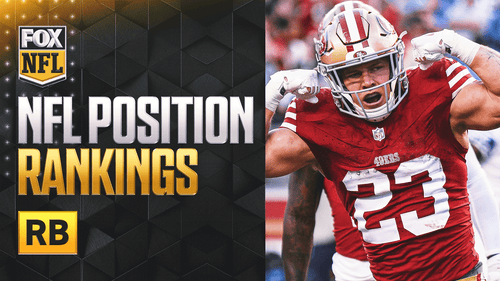
2017 Pro Football Hall of Fame Class: Why Each Man Made It
Feb 4, 2017; Houston, TX, USA; NFL former player Kurt Warner speaks with the media after being elected into the NFL Hall of Fame during the 6th Annual NFL Honors at Wortham Theater. Mandatory Credit: Kirby Lee-USA TODAY Sports
The 2017 Pro Football Hall of Fame class may be one of the most story-driven in NFL history. Examine every name and there’s an incredible narrative.
Nonetheless every class comes with questions. Namely why did this guy get in when that guy was more deserving? It’s just how the whole process goes. So a good way to help explain how things shook out for this group is by putting their accomplishments front and center. They weren’t given the gold jackets out of charity. Every man did something to earn it.
Kurt Warner, QB, Rams/Cardinals
A man who made it as much for his accomplishments as he did his incredible Cinderella story. Kurt Warner was the Hall of Fame quarterback who never should’ve happened. A one-year standout at Northern Iowa, he went undrafted in 1994. The NFL didn’t want him. So after working the night shift at a grocery store for a time, he decided to continue his football career in the Arena League. He tore it up for a short time before the St. Louis Rams gave him a tryout. They sent him to NFL Europe then brought him back to be their backup.
If not for a freak knee injury to Trent Green in 1999, nobody might ever know his name. Instead Warner stepped in and led the Rams to their first Super Bowl title. He became a two-time MVP there and seemed destined for a long career. Fate though was not done playing tricks on him.
Warner fell apart in St. Louis due to injuries. He spent a brief, forgettable season in New York before signing on as a backup in Arizona. Again aided by injury, he found his way back into the spotlight and led the Cardinals on a miracle run in 2008. This time he wasn’t able to get the glass slipper, but the man had proven his mettle as a Hall of Famer by that point.
Jason Taylor, DE, Dolphins
At the end of the day, what matters for a defensive end in the NFL is very simple: sack the quarterback. If a player can do that enough times in his career, he’ll have a shot at the Hall of Fame. Jason Taylor figured that out pretty quick. As an edge rusher for the Miami Dolphins, New York Jets and Washington Redskins he perfected the art over 15 seasons with 139.5 sacks. That places him sixth overall on the all-time list.
Many still believe he wasn’t worthy of getting in, but it wasn’t just the sacks with Taylor. He also forced 46 fumbles, intercepted eight passes and scored six defensive touchdowns in his career. It’s really not his fault that he played on some rather mediocre teams most of his career. It’s just hard to win anything when your quarterbacks are guys like an aged Dan Marino, Jay Fiedler, Joey Harrington and Mark Sanchez among others.
Jan 15, 2017; Arlington, TX, USA; Dallas Cowboys owner Jerry Jones on the field before the game against the Green Bay Packers in the NFC Divisional playoff game at AT&T Stadium. Mandatory Credit: Tim Heitman-USA TODAY Sports
Jerry Jones, OWN, Cowboys
Owners hold a lot of sway in the NFL because they control the cash. That’s the way it is in this business. Some though think this is giving them too much special consideration for the Hall of Fame. That’s not entirely true. If the past few decades have shown anything, it’s that great organizations always start at the top. The New England Patriots were nothing before Robert Kraft arrived. The Rooneys built the Pittsburgh Steelers.
And, love him or hate him, Jerry Jones has done a lot for the Dallas Cowboys. Not to mention the league itself.
Since taking over the franchise in 1989, they have delivered 15 winning seasons and three Super Bowl championships. That’s nothing to shake a stick at. He also seems to have no problems filling the role of that high-ranking villain the league needs. Jones doesn’t seem to mind that every football fan outside the Dallas-Fort Worth area utterly despises him and his organization. If anything he seems to relish it.
That’s fine, it makes the game more fun. If there was one thing that should be said of a Hall of Famer, it’s that.
Kenny Easley, S, Seahawks
Ask any player and they will say it’s almost impossible to reach the Hall of Fame in any sport by playing just seven seasons. So for Kenny Easley to pull it off is a testament to how great he was. He didn’t even play in 100 career games, yet it seems like he stuck it out for 200 when looking at some of the numbers he posted. Easley was the great ball hawk of his era with 32 interceptions in just 89 regular season appearances. Three of those he returned for touchdowns.
This isn’t even counting the eight sacks he had on top of it. Easley was destined to challenge the great Ronnie Lott for being the best defensive back of the 1980s. That is how good he was. Unfortunately a series of injuries and a failed kidney brought about by overuse of pain medications. Something that wasn’t safely monitored at that time. Had he played just another two or three years, he would’ve been a first ballot lock.
Terrell Davis, RB, Broncos
Despite a shorter career than many Hall of Fame running backs, Davis was undoubtedly one of the best to ever play the game. “TD” has been a finalist for the Hall of Fame twice now, and many Broncos fans felt he’s been snubbed just because of the length of his career.
But his induction into the Hall of Fame now proves it’s not necessarily the length of a career, but the impact you make in the time you’re given.
Davis is the leading rusher in Denver Broncos history, and according to DenverBroncos.com, he’s the only player in NFL history to be named league MVP, Super Bowl MVP, and rush for 2,000 yards in a single season.
Through ten years of eligibility, Davis has waited patiently for his chance to get into Canton among the best of the best to ever play. Knowing that LaDainian Tomlinson was a sure-fire first-ballot selection, there was question over whether the committee would induct two running backs in the same year. To the surprise of many, even Davis, it happened.
The fifth Hall of Famer in Denver Broncos history is arguably the most beloved player in team history outside of John Elway.
LaDainian Tomlinson, RB, Chargers
When the Atlanta Falcons traded up from the fifth overall spot in the 2001 NFL Draft, they did so to select Virginia Tech quarterback Michael Vick. The San Diego Chargers, who relinquished the number one overall pick, selected TCU running back LaDainian Tomlinson with the fifth pick in the draft, and now he can make a case as arguably the best running back to ever play.
Tomlinson’s 2006 season was perhaps the best any of us has ever seen from a running back in the history of the league, when he ran for 28 touchdowns (which remains an NFL record) and scored 31 from scrimmage.
This was a player that could truly do it all, and he was consistent. Not only was Tomlinson dominant as a runner, but as a receiver, he was exceptional. He caught 624 passes in 11 NFL seasons, and scored 17 touchdowns as a receiver in that time.
As a fan of an opposing team, I have nothing but respect for Tomlinson. For the majority of the decade he was in the NFL, he was a mismatch for anyone and everyone the Chargers faced. Of course, no single player can win you a Super Bowl, but it’s shocking that not one of Tomlinson’s teams even made it to the big game.
He was a special player, both on and off the field, representing exactly what it means to be a Hall of Famer.
Morten Andersen, K, Saints/Falcons
Contrary to the old school mentality, special teams is a third of the game. Kickers have just as important an impact on a football game even if they don’t log the same number of snaps. Too many championship games to count have come down to a field goal or even an extra point made or missed. Few knew those stakes and rose to them better than Morten Andersen did. Not only did he survive 25 years in the NFL, he was at his best in the big games.
Andersen is the all-time leading scorer in pro football history. He accounted for 2,621 points in his career. That included 565 field goals and 849 extra points made in the regular season. He also delivered the Atlanta Falcons to their first Super Bowl, making seven of his eight field goal attempts including the one to win the 1998 NFC championship in overtime. If the voters can’t put in the guy who has the most points, then can they justify everybody else?
Of course not.
More from NFL Mocks
This article originally appeared on









